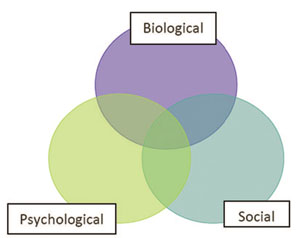9.2 What causes mental illness?
9.2.1 The biopsychosocial model

The causes of specific mental illnesses vary but most are caused by a combination of biological, psychological and social problems. Mental health professionals have developed a model of mental illness called the ‘biopsychosocial’ model (see Figure 9.8).
A model is a simplified way of describing how the different parts of a complex issue link together.
As Figure 9.8 shows, the biological, psychological and social factors often overlap. Here are some examples of biological, psychological and social causes of mental illness:
- Biological causes: genetic (inherited) causes, a chemical imbalance in the brain, head injury, alcohol or khat use, undernutrition
- Psychological causes: not loved in childhood, too many worries, the stress of somebody dying, disappointment, frustration, severe shock
- Social causes: poverty, not living in a good house, not having somebody who they can talk to about their problems, discrimination, migration.
Now read Case Study 9.1. As you do so, think about your answers to the following question:
Can you identify some possible biological, psychological and social factors contributing to Mr Hailu’s mental illness?
Case Study 9.1 Mr Hailu the farmer
A 33-year-old farmer developed mental illness after getting into a fight with one of his neighbours. For many years, the farmer had drunk araki every day to help him forget his problems. When he was drunk, he insulted his neighbour and they fought together. The neighbour hit him heavily on the head and the farmer fell to the floor for a few minutes before he was able to get up again. After that the farmer stayed in the house and then developed symptoms of mental illness. Nobody was sympathetic to the farmer because he had caused a lot of trouble in the local area. He had lost all his money because of his drinking, and his wife had gone back to her own family because she couldn’t stand it any longer. All these problems made him worry and he wished he had somebody to talk to. He couldn’t turn to his family because both parents died when he was a small child and his brothers lived far away.
Biological factors: in Mr Hailu’s case study he had a head injury and a long-term history of excessive alcohol use. Psychological factors: he had too many worries, and his parents died in childhood. Social factors: he was isolated and had nobody to talk to.
9.1.5 Stigma, discrimination and abuse
